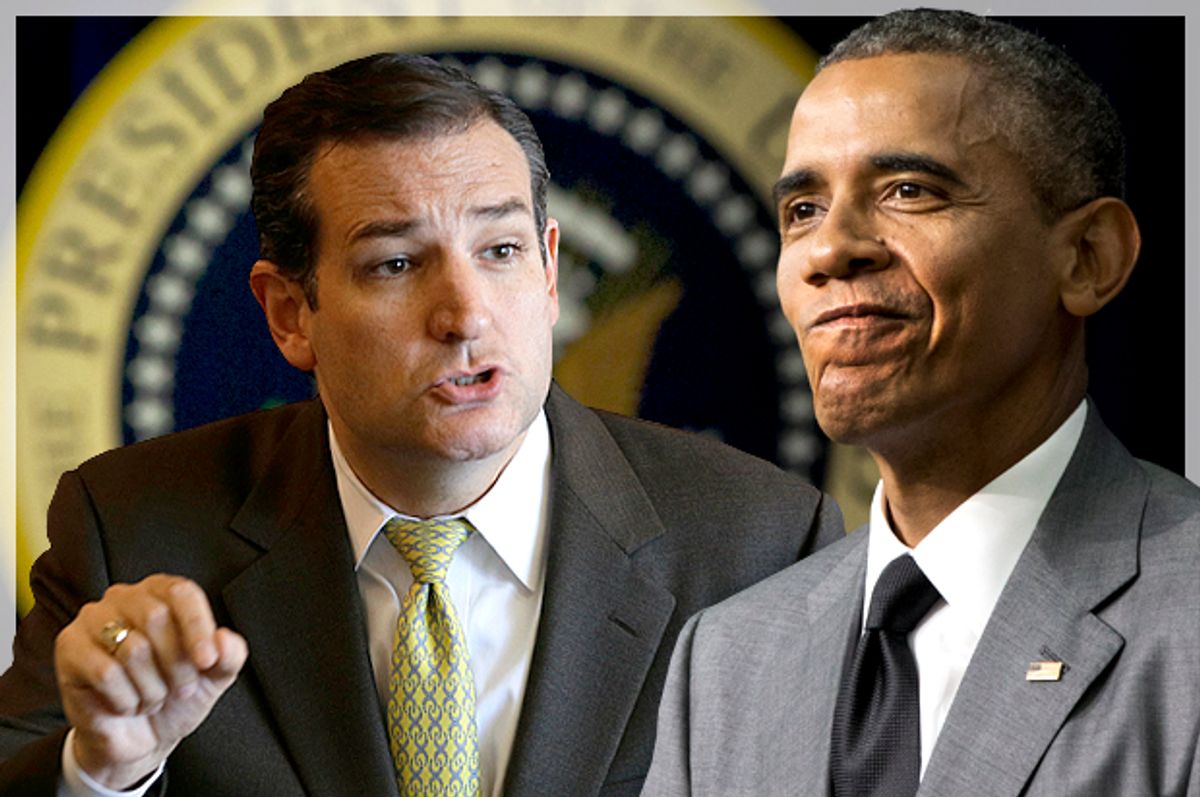As my colleague Jim Newell points out, newly christened presidential candidate Ted Cruz is chafing a bit at suggestions that he is just as “inexperienced” as another first-term celebrity senator who tried to run for president: Barack Obama. In an effort to dispel this pernicious comparison, Cruz is making the case that Obama, as a senator, was a “backbencher who “did not engage in a whole lot of issues of consequence,” while Ted Cruz has been on the front lines “leading the fight on conservative principles.”
This is mostly nonsense. Freshmen senators bear no burden or expectation of leadership and experience. You could actually make a credible case that no one has done more to hamstring conservative causes than Ted Cruz, given his propensity for sabotaging his own party’s legislative agenda. Cruz is trusting that voters will confuse spotlight-attracting bombast and a flood of press releases for “leadership.”
But it’s interesting that Cruz is trying so hard to claim he has “experience,” at least compared to Obama. To the extent that the question of “experience” matters for a young candidate depends largely on what they do to neutralize it in the face of opponents with longer résumés. In that sense, the Obama comparison is instructive. Sen. Obama took active steps to defuse the “experience” issue long before he ever became a candidate for president. Ted Cruz, on the other hand, is only now trying to deal with it, and he’s doing so by denying that it’s a problem.
Obama approached his time in the Senate with the understanding that his next step would be a run for the White House, and so he tailored his legislative pursuits to the type of campaign he wanted to run. Back in 2005 he was still doing the hope-and-change spiel and wanted to run as the consensus builder, the guy who could overcome partisanship and work with Republicans to cobble together happy little centrist compromises. And so when he got to the Senate he looked for Republicans to work with. In 2006, he and Richard Lugar wrote legislation curbing the proliferation of conventional weapons and WMD, which was later incorporated into a bill that passed into law. He teamed up with Tom Coburn to call for oversight of Hurricane Katrina relief spending. It wasn’t exactly earth-shaking stuff, but it filled out an empty résumé and allowed for him to credibly argue that he could work with the GOP.
One of the most important things Obama did was to keep a low profile early on – if he had come into the Senate and tried to use his burgeoning celebrity to force his will and vacuum up attention, he would have bred the sort of resentments that make legislating impossible. “What Sen. Clinton did when she first came in was what any person would do when they come into a new environment, that is listen and learn before you speak and you act,” Obama said in June 2005. “I have tried to follow that same wisdom.”
Cruz came into the Senate and opted for a very different approach. Before the first month of his Senate tenure was up, he’d pissed off Democrats by lobbing false accusations at Chuck Hagel during his defense secretary nomination hearing and suggesting that Hagel may have accepted money from North Korea. Less than a month later his Republican colleagues were slagging him as “Jim DeMint without the charm.” By the end of September he was attacking members of his own party as cowards for not joining his crusade to shut down the government over Obamacare. When asked by Fox News’ Megyn Kelly what he’d actually accomplished as a senator, Cruz boasted that his biggest achievement was stopping the achievements of others: “What we've accomplished over and over again, in many instances, is stopping bad things from happening.”
To be clear, that’s exactly what Cruz promised he would do during his Senate campaign, and he takes a great deal of pride in his work. He, like Obama, has used his time in the Senate to lay the groundwork for the sort of campaign he wants to run – that of the unflinching conservative outsider who isn’t afraid to take on both parties.
But it’s tough to see how Cruz’s strategy ultimately prevails. Cruz, like Obama before him, will be facing questions about his experience and his ambition, given that Republican voters have been taught to believe that first-term senators make bad presidents. Obama headed those questions off by building up reservoirs of trust and goodwill among Washington’s power brokers. When it came time for him to make his case to voters and donors, Obama could say “granted, I haven’t been around long, but here’s what I’ve done, and people from both parties can vouch for me.” That relationship building also paid dividends in the “superdelegate” fight from the 2008 Democratic primaries, when both Hillary Clinton and Obama were fighting for the endorsements of D.C.’s Democratic elite. In the end, a lack of “experience” didn’t end up hurting Obama – both Clinton and John McCain tried to cast him as a brash neophyte, and Obama took them both down.
Cruz will be facing a GOP field stuffed with current and former governors who have long records they can point to when arguing their case to Republican voters. And he has provided them everything they’ll need to paint him as a cocky and self-destructive upstart. In the face of this, Cruz will stand largely alone as he points back at the swath of political destruction he’s carved over the past two years saying, “Look what I built!”

Shares